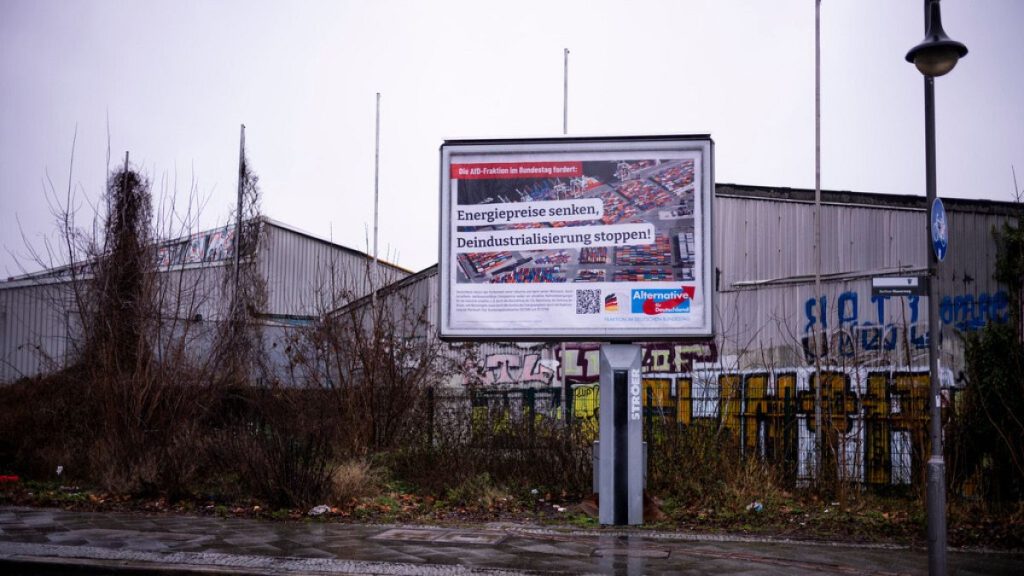The Alternative for Germany (AfD), a far-right political party, has ignited a firestorm of controversy in the lead-up to Germany’s February 23rd elections. The controversy centers around campaign flyers distributed in Karlsruhe, designed to mimic airline boarding passes. These mock tickets display the AfD logo and feature the words “Departure: Germany” and “Destination: Safe Country of Origin,” with “AfD” listed as the departure gate. Slogans like “Only remigration can save Germany” and “It’s nice at home too” further contribute to the flyers’ provocative message. Police have initiated an investigation into the local AfD branch responsible for the flyers, suspecting incitement of hatred. Public outcry and complaints from political opponents, particularly the Left party, have amplified the controversy. The Left party alleges that the flyers were intentionally distributed to mailboxes belonging to individuals with migrant backgrounds, accusing the AfD of deliberate xenophobia and an attempt to fuel societal division.
The AfD’s national branch has attempted to deflect criticism, claiming the flyers were intended for all eligible voters, with a concentration in Karlsruhe due to their local focus. They also announced plans to share the flyer template with other local branches. Despite these assertions, the police investigation continues, drawing parallels to a similar campaign tactic employed by the now-renamed National Democratic Party of Germany (NPD) in 2013. The NPD’s campaign involved distributing fake flight tickets with the message “From Germany – Destination Home,” a campaign widely condemned as xenophobic propaganda. The NPD subsequently faced severe repercussions, including being barred from receiving state funding and tax breaks, following widespread protests against their extremist rhetoric.
The AfD vehemently denies any association with the NPD’s previous campaign, dismissing any connection as unfounded. However, the current flyer campaign aligns with the AfD’s broader stance on immigration and their embrace of the term “remigration.” This term, championed by AfD chancellor candidate Alice Weidel, suggests a policy of mass deportation, although the specifics remain ambiguous, particularly regarding the inclusion of foreigners with legal residency rights. Weidel’s open endorsement of “remigration” marks a departure from her previous attempts to distance herself from the term, which had previously sparked national protests following revelations of a senior AfD member meeting with controversial Austrian far-right activist Martin Sellner to discuss “remigrating” foreigners and “non-assimilated” citizens.
The “remigration” concept also finds resonance in Austria, where hard-right politician Herbert Kickl has promoted similar ideas and recently gained prominence in coalition talks following his party’s electoral success. This confluence of far-right ideologies and rhetoric across national borders highlights a concerning trend within European politics. The AfD’s embrace of such divisive language raises questions about the party’s true intentions and the potential consequences for Germany’s social fabric.
The AfD currently holds second place in national polls, garnering 22% of the vote according to the latest INSA poll. However, other major parties, including the leading center-right Christian Democratic Union (CDU), have categorically ruled out any potential coalition with the AfD. This effectively isolates the AfD from mainstream political power, making their inclusion in government unlikely unless a dramatic political upheaval occurs. The other parties’ refusal to collaborate with the AfD underscores the deep divisions within German politics and the widespread condemnation of the AfD’s extreme views.
The AfD’s “deportation ticket” campaign, its embrace of the “remigration” concept, and the echoes of past extremist campaigns raise serious concerns about the party’s direction and its potential impact on German society. The controversy surrounding the flyers highlights the ongoing debate about immigration, integration, and national identity in Germany, a debate that is likely to intensify as the elections approach. The police investigation and the public response will play a significant role in shaping the political landscape in the coming weeks, potentially influencing voter perceptions and ultimately the election outcome.

